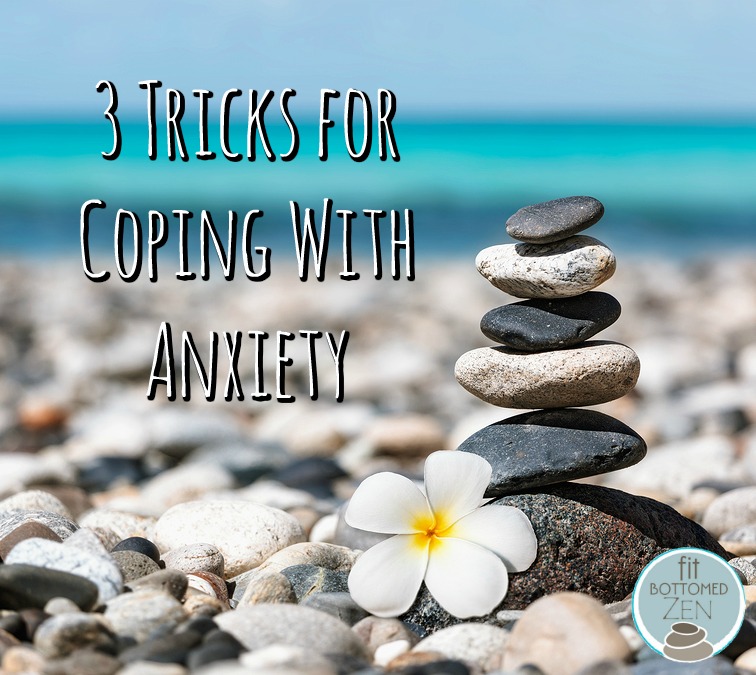3 Tricks for Coping With Anxiety

Anxiety — it is not my favorite. But, like it or not, it’s been a pretty constant companion of mine for … well, pretty much most of my life. There have been times when it’s really taken over — helped along by its good buddy Depression — but for the last dozen years, I’ve kept it more or less at bay with a few tricks* I’ve picked up along the way.
*I have also been on anti-anxiety medication in the past. At that time, it was the right choice for me, and if I reach that point again, I will not hesitate to see my doctor. If you are truly struggling, I encourage you to talk to a medical professional, like, today. Employing these tips and any others you might find are always worth a try, but you should never, ever feel like you can’t or shouldn’t ask for the help you need. Ain’t no shame in the game when it comes to taking care of yourself!
How to Deal With Anxiety: 3 Tricks That Work for Me
1. Breathe — and take up space. Taking at least three long, slow, deep belly breaths can be a total game changer. When those feelings of anxiety start creeping in, I will either stand up like Wonder Woman or sit up straight in my chair with my knees wide and feet flat on the ground, close my eyes and breathe just as slowly as I can. Usually, I’ll try to breathe in for a five count, hold it for a beat, then breathe out for five, hold for a beat. This can also be a great time for a short meditation — maybe focus on a specific object in front of you as you breathe, and consider the object’s color, weight, texture, smell, distance from you, distance from other objects. Anything that slows you down for a moment is great.
Of course, it doesn’t change the actual situation I’m in — if I’m about to confront someone, I’m still about to do something I’m not comfortable doing. But my reaction changes. It’s like turning the buzzing in my brain (and, really, my whole body) down a few notches so I can remain more calm and rational, allowing me to move forward with greater ease.
2. Ask my questions. Years ago, I was talking to a therapist and enumerating all of the things I was completely freaking out about — the list was long and every item on the list felt significant and overwhelming and inevitable. The therapist told me to picture that list and ask myself, “What is real? What is true?”
This approach keeps me from spiraling and turning something manageable into certain doom. There are loads of potential outcomes for basically any situation, and when you’re in the grips of anxiety, it’s extremely easy to see some of the worst case scenarios as the most likely outcomes. When I really stop and ask myself about what’s real and true, it helps me realize that the potential outcomes that are freaking me the hell out have not happened and very likely will never happen. Then, I can focus on the task at hand and work toward the best possible outcome.
3. Focus on the present. Sometimes, the anxiety we’re feeling is totally warranted. Things are going wrong and, even when you narrow it down to what’s real and true, it doesn’t look good. But every time this happens, I find that something — something right now, in this very moment — is still okay, and I hold onto that like a life preserver. All the other things blowing up around me doesn’t change the fact that, say, my dog loves me or I have a warm mug of coffee in my hands or the fact that I had a wonderful conversation with a friend earlier that day.Once I get my head out of the “zomg everything is terrible” place, I envision that list of things that need to be dealt with and focus strictly on what I can do right now — everything else gets cut. I put anything happening in a week or a month or a year entirely out of my head — it’ll still be there later, when I’m in a better place to deal with it, but for right now, piling that on just isn’t helpful and it isn’t necessary. After I get all that extra noise out of the way, I generally see the here and now as something I can handle and move past.
It’s also worth noting that getting in some form of exercise, making sure I’m drinking water and eating healthy food, and enlisting the help of friends when I start experiencing higher-than-usual levels of anxiety are all key. The importance of good self-care can’t be overstated!
These are just a few suggestions that’ve worked for me, and I know many other people have lots of big — and small — ways to cope with anxiety.
Got a trick you’d like to share? Go for it in the comments! —Kristen
